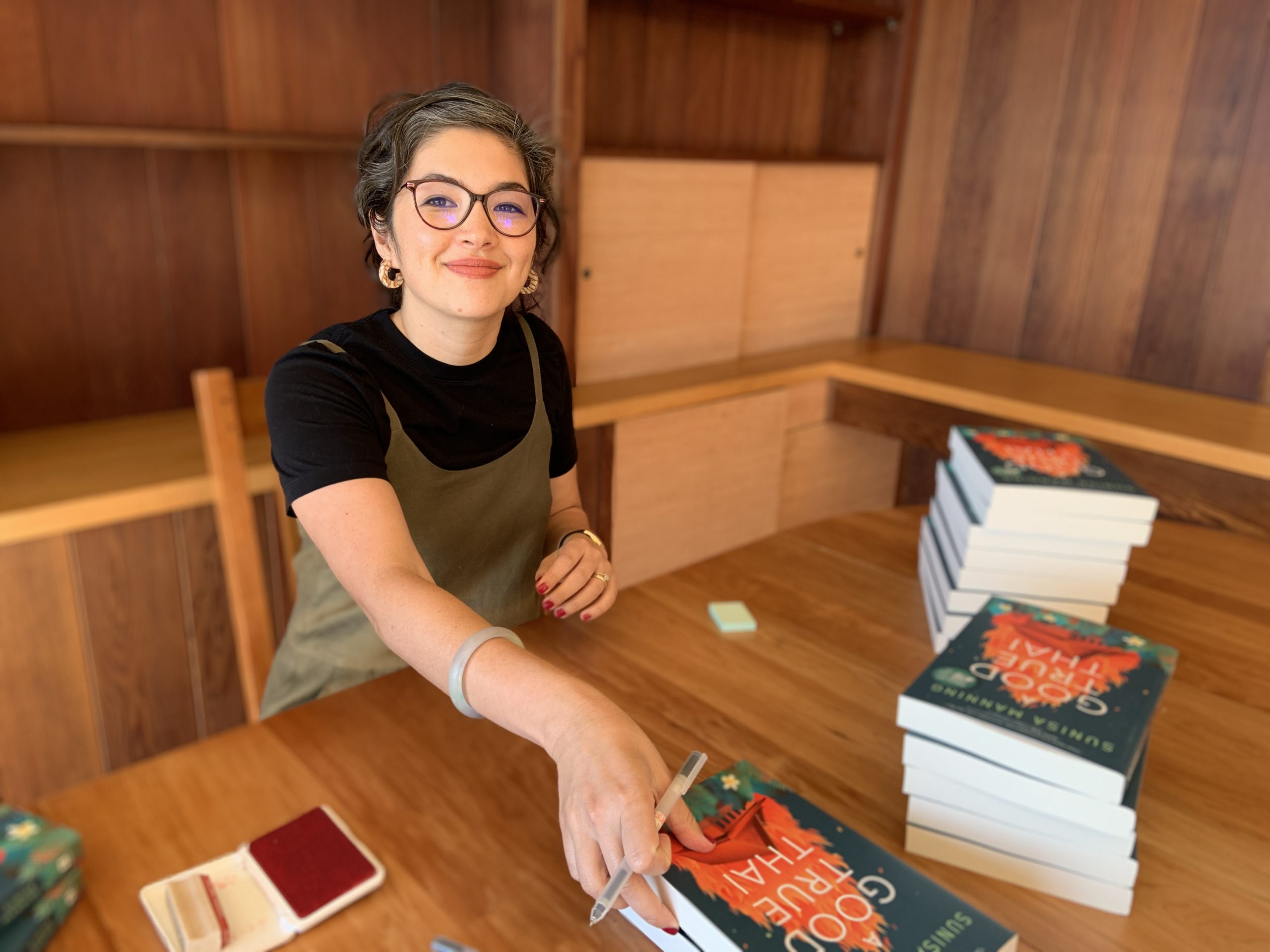Young Thais are raising a political commotion, and their unprecedented public criticism of the country’s untouchable monarchy has shocked the world.
But this is hardly the first time Thai youth have made headlines. University students also set the country ablaze in the 1970s, protesting a military dictatorship back then as well. Police violently crushed the movement in 1976 in what would become known as the Thammasat Massacre when police and far-right groups shot dead or lynched what is officially reported as 46 Thammasat University student protestors. Survivors of the tragedy, the 44th anniversary of which is approaching on October 6, say the number of dead was closer to 100. By the time the violence ebbed, 167 other students were wounded and more than 3,000 protestors were arrested.
It was this movement and its brutal end that inspired Thai-American author Sunisa Manning’s new historical fiction novel published in recent weeks, A Good True Thai.
In Manning’s novel, which took five years to research and write, she explores the radicalisation of Thai student protestors in the 1970s. Set in Bangkok and a fictional town from 1973-76, the book follows three university-aged Thais as they venture into the jungle to join the communist movement against Field Marshall Thanom Kittikachorn, Thailand’s real-life military dictator from 1963 to 1973.
The novel’s themes of dictatorship and democracy strike close to present-day Thailand, where a democratic movement has built speed since the country’s disputed 2019 election. Manning probes whether democracy can truly thrive in Thailand or it’s simply a Western ideal, including a quote from 19th century monarch King Chulalongkorn in the epigraph stating: “Democracy in Thailand must be different from democracy in the West, because Thais eat rice, not wheat.”
The question is one many Thais have been grappling with since 1932, when the country first shifted from an absolute monarchy to a constitutional one, and the decades of coup d’etats and political turmoil that have ensued up to this day.
Born and raised in Bangkok with a Thai mother and American father, 35-year-old Manning wrote A Good True Thai to chronicle her own coming-of-age journey to political awakening. The characters’ path to critical thought mirrors her own, she said.
“When [the characters] look at Thailand they say, ‘well does it seem like a fair place? Does it seem like a lot of people have access to opportunities?’” Manning told the Globe in an interview this week.
Thailand’s class divide, among the largest in the world by some estimates and a significant topic of conversation in current discourse, features heavily in the story of A Good True Thai. Manning wrote her three protagonists into different classes and demographics, telling the story of the 1970s pro-democracy movement from varying perspectives.
Chang is a poor boy from Bangkok’s Khlong Tuy slums who earns a scholarship to Chulalongkorn University through ranking high in the national exams. Manning saw this as a “typical radicalisation” for the time period as Thais of low socioeconomic class sought access to opportunities that eluded them in a highly class-divided society.
Lek, a female Chinese immigrant, faces both gender and ethnic discrimination. The third, Det, is of royal lineage, offering him substantial privilege in a country highly deferential to its monarchy.
One of the main differences is the ability of students today to use social media, hashtags amplifying that they are being watched
“He’s one of the nobility, and in many ways radicalising would go against his interests,” Manning said of the character, describing the intertwining dynamics of her protagonists. “I was interested in why someone with privilege would make space for people who have less.”
This involvement of middle- and upper-class youth in Thailand’s pro-democracy movement is something that can be seen today – perhaps an indication of a growing awareness among Thai youth hailing from elite families about the kingdom’s injustices.
The character Lek was inspired by Manning’s own mother, who attended university during the movement, but did not radicalise with other students. She’d come from a poor family and could not afford to jeopardise her scholarship or post-graduation job opportunities by getting involved in politics.
That left Manning to wonder about the possibility of an alternate universe, of scenarios in which someone like her mother would make a different choice. Some of these are present now, she said, enabling some young people with “an appetite for risk and idealism” to act on their aspirations in a way earlier generations could not.
“One of the main differences is the ability of students today to use social media, whether that’s hashtags amplifying that they are being watched, or videos of police surrounding buildings – that’s really different,” she said. “The students I wrote about [who live] in the 70s didn’t have that kind of public scrutiny that they can claim to bear on the authorities.”
Despite the world watching, Manning said, the possibility of violence similar to that seen 44 years ago in 1976 still looms.
“I think the threat of violence is always there. I think Thailand is ruled by a military government that threatens force.”
Manning said that she felt free to write more explicitly about some subjects in English and living in the US than she would writing in Thai, and living in Thailand. With a military-backed government liberally imposing harsh penalties for those who fall foul of the country’s strict lese majeste and libel laws, Manning said that fiction creates a space in Thailand to say things that normally cannot be said.
“Thailand has such strict laws around what we can and cannot say that I think that Thai fiction and poetry, and a lot of Thai art, can be very playfully subversive through use of metaphor or allusion, implying things that become humorous,” she said.
A Good True Thai is now available in Thailand at Asia Books, Kinokunya, and Booksmith Project at Gaysorn Plaza.


